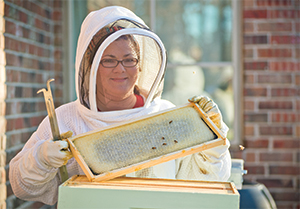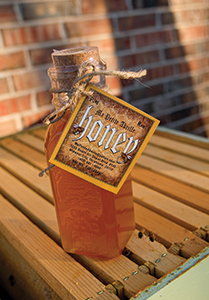Backyard Bees
On warm Oklahoma days, Suzanne Govett’s yard east of Edmond buzzes with the hum of industrious bees that fly in and out of the two hives she keeps in her backyard. Although she cares for the hives, the bees don’t really rely on her too much. Instead, they go about their business of collecting pollen for honey and building their community.
 “I love to just watch them,” she said. “I love to check out the pollen baskets on their little legs to see what color pollen they have, see what they are going about and doing. It’s fascinating. Beekeeping is pretty addictive.”
“I love to just watch them,” she said. “I love to check out the pollen baskets on their little legs to see what color pollen they have, see what they are going about and doing. It’s fascinating. Beekeeping is pretty addictive.”
Govett, who started backyard beekeeping three years ago, has eight hives today and simply took a local class to get started. In an era when bee populations are dangerously declining, these backyard beekeepers are helping a species survive. In turn, they are rewarded with the sweet payment of honey, up to 60 pounds per hive in Govett’s case.
Now, beekeepers are spreading the word that anyone can have a hive, help the bee population and harvest their own honey. It’s as easy as taking a few classes and ordering the supplies.
Buzz About Bees
According to Global Research, in the last half decade alone, 30 percent of the national bee population has disappeared and nearly a third of all bee colonies in the U.S. have perished. Today, honeybees are trucked to various regions of the country just to help pollinate an estimated $40 billion worth of the nation’s agricultural produce each year.
 Every third bite of food we eat comes as the result of bees and other pollinators, according to the organization, but bitterly harsh winters, severe drought and the increased use of pesticides and fungicides have all led to the bee apocalypse.
Every third bite of food we eat comes as the result of bees and other pollinators, according to the organization, but bitterly harsh winters, severe drought and the increased use of pesticides and fungicides have all led to the bee apocalypse.
Knowing the detrimental effects a smaller bee population could have on society, citizens are clamoring to help. According to Brent Hawley, manager at Beekeeping, Etc., bees are selling out earlier and earlier every year.
“The demand for bees is high, and we start selling out of bees by February,” he said. “People understand the issue with the decline in bee populations, and they want to help, so a lot more people are getting hives.”
The Beauty of Bees
Mike Cleveland and Mark Ferguson, partners in Rogue Bees Apiary in Newcastle, didn’t set out to become beekeepers. In fact, they just wanted to make mead, a type of honey wine.
“We spent a year making mead, but honey is very expensive,” said Cleveland. “We said, ‘Why not make our own honey?’ So, we started beekeeping, and that sort of took over. Mead is now secondary to the beekeeping.”
Now in their third year in business, Rogue Bees has 30 hives, sells hive kits and often mentors other budding beekeepers. The only time the bees sting, they said, is when you do stupid stuff and provoke them. Also, a bee colony will let people know what mood they are in. The hotter the day and the more the sun shines, the happier the bee. Cold, gray and wet days put bees in a foul mood.
Most people who visit Rogue Bees fall in love with the idea of beekeeping. Robbie Franz of Norman was one of those people. Franz started his one backyard hive in March of 2014.
“I started with a queen and a packet of bees, about 3,000 bees,” he said. “By August, I had 90,000 bees and had two harvests of honey in my first year, which is rare. It’s so easy to raise bees. You hardly have to do anything. In fact, I probably mess with them more than I should.”
Beekeeping Basics
The absolute first thing a budding beekeeper should do is find a mentor, most experienced keepers advise. The Central Oklahoma Beekeepers Association and the Oklahoma State Beekeepers Association both offer mentoring, classes, supplies, advice and more. Seminars and meetings also help budding keepers.
At the very basic level, you need a commercial hive designed for bees, bee suits and gloves and the bees themselves. Most of the time, basic start-up costs range between $200 to $400. Beekeeping, Etc. sells starter kits appropriate for beginners.
Bee hives and bees are available locally, but you can also order queens and bees via the internet and have them delivered. Yes, bees can be mailed to you.
According to the Oklahoma Department of Agriculture, Food and Forestry’s Oklahoma Apiary Act and Rules, beekeeping is legal and encouraged in the state, so long as the bees are disease free. The fee to register an apiary is $10 with a $10 inspection fee of up to 25 hives.
“Beekeeping really is very easy, and it is something anyone can do to help the environment,” said Franz. “Plus, it’s fascinating. I can watch these bees for hours.”
For more information, visit okbeekeeper.blogspot.com or okbees.org.




